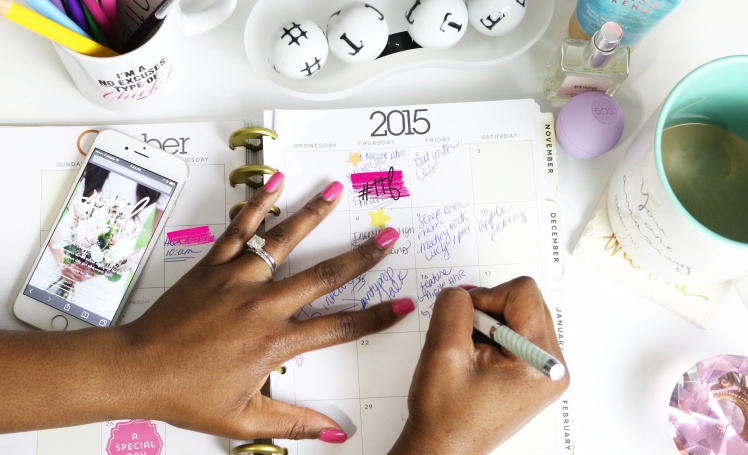We want to study our Bibles. We know we should study our Bibles. The preacher tells us pretty much every Sunday that we should study our Bibles. There’s nothing really stopping us from studying our Bibles…
…and yet, for all that, we don’t study our Bibles.
Why? It’s not that we don’t have the time. If you are reading this article you have time. We all have the time to do the things that we want to do, if we are honest with ourselves.
If Bible study is something that just happens for you, then good for you, but chances are (if you are like me and 99% of the rest of human beings on this planet) Bible study is not going to just happen. You aren’t alone, and you aren’t a bad-Christian-beyond-repair if you don’t enjoy Bible study. All that is needed to reform you is a bit of know-how, a proper sense of priorities, an intentional scheduling of your time, and a way to turn those good intentions (that I know you have) into good habits (that I know you can develop).
For most of us, it’s going to take some preparing, prioritising, planning, and repackaging to make Bible study anything of a habit. I’m definitely not claiming perfection in this area (I’m a constant work in progress), but here are the strategies that have helped me go from Bible-shunner to an avid Bible student.
Step 1: Preparing – Do what it takes to prepare yourself for study.

Sitting down to study the Bible was a constant frustration for me. Every time I would even think about reading the pages of that thick, black book with the faded golden edges filled with archaic words (and what seemed to me like endless genealogies), my head would spin. Sometimes I would start at the beginning – reading through Genesis and getting stuck around Exodus 20.
Other times I would try and tackle Paul’s writings and end up agreeing with Peter, that “there are some things in them that are hard to understand” (2 Peter 3:16). Well, actually I thought that most things in them were hard to understand, but probably that Peter was just being polite and didn’t want to discourage Paul.
Becoming a Bible student seemed hopeless – until I decided to actually treat Christianity like it was my career. I enrolled in a two-year, full-time Bible college degree and spent my days studying and being taught the Scriptures.
Is it any wonder that we struggle with understanding the Scriptures? We spend upwards of 30 hours a week in school for 13 years of our lives (more if we get higher education) all in order to gain an entry-level knowledge in the of our choice. Then we spend 2-3 hours every week at church, and perhaps a few minutes a day reading over a few chapters on Bible-reading plan (chapters that we may or may not understand) and we expect that we will become experts?
Obviously, it doesn’t work that way.
Ezra, before he taught the Israelites the word of God, prepared himself. He was a skilled scribe, and he was skilled because he set his heart to the study of the Law.
“Ezra […] was a scribe skilled in the Law of Moses that the LORD, the God of Israel, had given, and the king granted him all that he asked, for the hand of the LORD his God was on him. For Ezra had set his heart to study the Law of the LORD, and to do it and to teach his statutes and rules in Israel” (Ezra 7:6, 10).
He knew that if he was to teach the people, he needed to know what he was talking about. Shouldn’t it be the same for us? And aren’t we all supposed to know enough to be teachers at some point (Hebrews 5:12)? At the very least, we have to be able to give a reason for the hope that is within us (1 Peter 3:15).
It is because of this that I honestly believe that to at least some degree should all be treating Christianity like our full-time vocation, or “calling” (cf. Ephesians 4:1), just like Ezra did. Do what it takes to prepare yourself for study. Very often we becomes Christians starting off with very little Bible knowledge, like babies (Hebrews 5:12-14; 1Peter 2:2), and yet we expect ourselves to be able to be able to understand complicated concepts we have never given any thought to before, and to be able to read the King James Version and at the drop of a hat (which is, by the way, pretty much like learning another language).
In my opinion, it’s best to undertake some sort of training program in order to give yourself a headstart and see what Bible study should look like. My husband and I both went through two-year Bible colleges, and my husband continues to study university level Bible courses. We both know ourselves, and we know that we needed a structured course of study in order to get anywhere.
Of course, I understand that this is not always feasible, and definitely not necessary to developing Bible literacy, but find something that suits you: your personality and your lifestyle constraints. At the very least, it will be extremely helpful to undertake some sort of hermeneutics (a fancy word for “how to study the Bible”) course in order to learn some of the basic terms you’ll come across while doing your personal study, how to find out some basic historical context, and how to use the tools available to you.
A little introductory book I enjoyed along these lines is Women of the Word, by Jen Wilkin. It’s like a mini hermeneutics course for women, and it goes over the basics of what Bible study should look like. I don’t agree with everything she says, but still – it’s very useful. Come Fill Your Cup also has some great, exegetical resources. There are also a number of great (and free!) online courses you can undertake in a systematic way (see links at the end of this article). These are some great places to start when you don’t know where to start! Find out what kind of a person you are and do what is necessary.
Another thing that my husband and I do is that we invest in Bible study tools. If we like a certain Bible, tool, or book that is going to enhance either our knowledge or the experience – we buy it. We see these things as investments in our education. You need to buy expensive textbooks for College – so why not buy a few useful Bible study tools?
________________
2. Prioritising – Make Bible Study a Priority in Your Every Day

“You need to schedule Bible study at the same time every day, and in the same place,” I heard over and over again from various instructors, “it’s the only way to develop a proper habit.“
And oh, I tried. I tried to do it at the same time and in the same place. My instructors said that’s what I needed to do and it was the only way to develop a habit. For years, I hated myself and my inability to develop a regular time and circumstance for Bible study. But then I realised something – what works for one person doesn’t always work for everyone.
If making a time at the same time everyday works for you – great. Set an alarm, make a nice space – and you’re done. But, I am not a person that does well on a regimented schedule, and it’s very likely that if you are a mum of littles, you are not this kind of a person either.
And that’s ok – because try as you might you’ll never find an actual command to study the Bible in any certain way, at any specific time. It is to be our meditation all the day (Psalm 119:97, 98). So if we take 10 minutes here, and 5 minutes there or we sit and study while the kids make a raucous, we aren’t having any less of a Bible study time than someone who has the leisure to sit in a quiet place for an hour. The point is intention, apart from that, you do you.
Still, being human as I am, I obviously need some kind of a plan. You’re never going to get anything done if you don’t make it a priority, right? So, instead of having a specific time of day, I have a specific set of tools that I make sure are always available: My wide-margin bible, some pens, and e-sword (whether on my laptop, or my iPad). If I know I’m going to be at home, I clear my space the night before (ideally), or at least have the things I need in eyesight. If I know I’m going out, I pack these things in my bag so I can do my study in the car, at a cafe, or just anywhere I can plonk down for 5 minutes or more.
Make it hard for yourself to fail. If your Bible is tucked away on a shelf, it’s not likely you’ll think of it. Bring it out, along with anything else you need. Set yourself up for success!
________________
3. Planning – Have a purposeful plan for how you are going to study

So, you know the basics of how to study the Bible, you’ve got the time/place/tools you need for Bible study, and you’re ready to go. However, you’re not going to get much purposeful Bible study done if you don’t have a plan. “Just opening up and reading whatever your finger lands on,” or “just reading a chapter from somewhere” may work every now and then, but will it help you be a Bible scholar? Will it really help you understand Christ? Hmm, notsomuch.
So, you need a plan. I personally don’t love Bible reading plans as the sole method of Bible study. Don’t get me wrong, I think they can be useful, but they need a little help in order to be truly useful. Just reading without understanding isn’t useful to anybody.
I personally think it’s great to undertake a purposeful, in-depth study and a Bible-reading plan at the same time. This way, you can get a broad, sweeping look as well as a narrow, focused look at the Bible. When I do this, I find my study is greatly enhanced, and often ideas will cross between the two readings. There are plenty of reading plans out there, but I personally like a bit of a feeling of community to keep me motivated, so at the moment I’m following along with the Good Morning Girls reading plan (I like this plan, because it’s fairly light and easy to do alongside the other) and doing my own in-depth study book by book.
Whatever you are doing, move purposefully. Look at the big picture and individual words. I Study something deep, and something wide. You know, like:
Deep and wide,
Deep and wide,
Make your Bible knowledge
Deep and wide!
Read this article for more about how to study a passage in depth.
4. Repackaging – Change the way you study to make it fun

Fun? Bible study?!
Seriously, is that allowed?
Well, why not? We make it fun for our children, with games, competitions, charts, and rewards – but then all of a sudden, for some unknown reason, that all has to stop when we become adults. Maybe it’s because it feels like you should just want to study, like having to make it fun means that it doesn’t count. Like having to have a little incentive to study will make you fall that little bit too short of the pearly gates.
I’m not saying that we need to play a game or wear a party hat every time we engage in Bible study, but I do think we should do something to make it enjoyable for ourselves. Something more than just forcing yourself to read three chapters of the KJV and then telling yourself you enjoyed it. Don’t you get great joy when you see little kids having fun learning about the Bible? Why are we not as kind to ourselves as to the children? Make Bible study something you look forward to.
For me, this invariably involves coffee. Coffee, some nice pencils for marking (Faber Castell), a nice felt tip fineliner for writing, a nice Bible that I love and e-sword. Some days, if I feel a particular aversion to study, I’ll meander down to the local Starbucks and have a cup while I study and the baby plays. This is fun for me.
For some people fun means community. They love people and discussion. If this is you, then a facebook group like Digging Deep in God’s Word, with discussions, and focus, and other ladies to interact with, is probably more your cup of tea. Or just rope in a sister, encourage each other over text, and then head to your local cafe once a week to discuss and just generally enjoy each other’s company (and coffee). I think there was a reason that the early church grew so much, with how much they were in each other’s lives, fellowshipping in one accord and with one mind (Acts 2:41ff).
It really isn’t any less holy if you enjoy yourself! Make it fun – whatever that means for you. Get creative.
And on those days where you really, really don’t feel like it? You’ll have strategies 2 and 3 to fall back on. You have your priority, you have your plan – and you always have prayer. You got this, and you’ll most likely enjoy it once you start.
______________
What strategies help you to build a stronger Bible study habit? Has this post helped you? Tell us in the comments below!
______________
Free online courses:
- Online Academy of Biblical Studies
- M.O.S.T program with Memphis School of Preaching
- Digging Deep in God’s Word
- Free ebook: Study in James, by Jen Wilkin
- Come Fill Your Cup: Bible Marking and “Finer Grounds:” Exegetical Study
______________






I love this, especially the last point. I think I am going to find a friend to be accountable and engaged in bible study with. I’ve been aware of my lack of time in the Word lately but unable to kick start my way back into it, into Him. Thanks for this useful post!
LikeLike
Yay! Go you! ♥️
So glad you found this useful Aimee. God bless! xx
LikeLike
Hi Chantelle, Thanks for this article! I had heard of some of the resources you list – Come Fill My Cup, Digging Deep in God’s Word (have done several years of this study), and OABS. But I hadn’t heard of Jen Wilkins book. Shane was picking up something for me at a Bible bookshop yesterday (for Mother’s Day 🙂 so I got him to get the book too. They were having 20% of everything! I have had a look at the James study too and particularly like her introductory statements. I found that I do some of the things mentioned when I study (eg read the passage over and over) but not all of them. The book looks good. Shane thinks he might read it too. So thanks for taking the time to mention these resources. Love, Kathy W. Perth, WA
LikeLike
Hey Kathy!
So glad you found something useful in my article! I really hope you enjoy hat book, it has been a blessing to me, for sure!
Love you!
Chantelle
LikeLike
Hi Chantelle, I read Jen Wilkin’s book in a few days! I know when I have found a book that really “speaks” to me, I take to it with a pen! Underlining important passages, writing comments in the margins etc Did that with this book. So helpful. I am currently doing her study of James. Thanks again for this article and for drawing my attention to this book. Love, Kathy
LikeLike